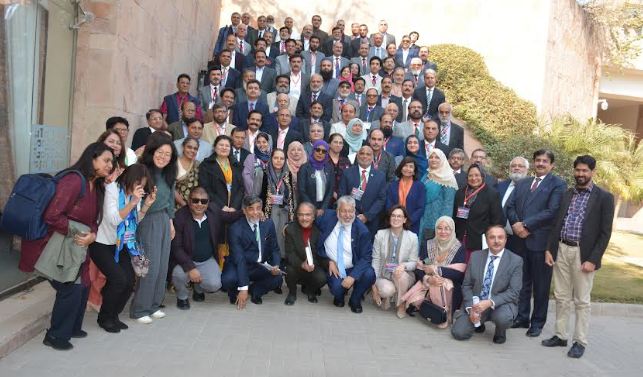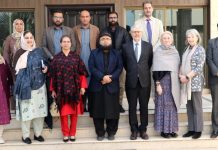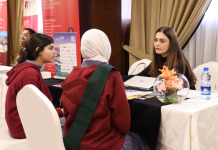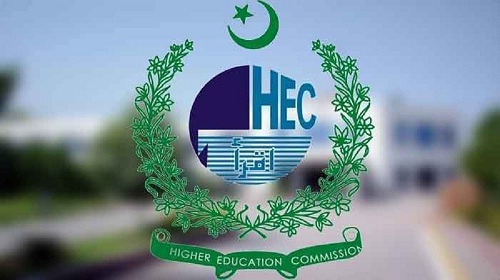Islamabad, Jan 15 /DNA/ – The Higher Education Commission (HEC) organized two-day 54th Vice Chancellors (VCs) committee meeting to address the most critical and urgent issues in the higher education sector of Pakistan here in Islamabad.
The meeting brought together the VCs of public sector universities from across the country to find solutions to increase employability of students, achieve self-sustainability of Higher Education Institutions (HEIs), move towards digitization, and enhance public-private partnership.
In his welcome remarks, the Chairman HEC Prof. Dr. Mukhtar Ahmed listed down the agenda of the meeting, and set the frequency for a solution-oriented discussion. He highlighted issues including attaining self-sufficiency amidst financial crunch, increasing employability, boosting the IT and business sector of Pakistan, and localizing the semester system to better suit the needs of the country’s higher education sector.
The agenda also included deliberation on drug free campuses, introduction of a Unified Pay Scale and revised eligibility criteria for appointment of teachers, along with finding solutions to the challenges faced by the HEIs while implementing HEC’s policies, and selection of the Chair of Vice Chancellors’ Committee. Dr. Zahoor Ahmed Bazai, VC, University of Balochistan was elected as the Chair of the VCs’ Committee.
The Chairman HEC termed the VCs’ meeting as a platform of the intellectuals to come together and define the future of Pakistan by redefining the role of the universities. “While our job is to impart education, I think we also owe it to our youth to give them a glorious Pakistan, and it is not possible without fixing the challenges our universities face today. The Prime Minister has been holding regular meetings to inquire about the steps being taken to boost graduate employability, the IT sector and business market of Pakistan. It is about time that we move beyond just discussing the issues and brainstorm the solutions to these challenges.”
The meeting featured presentation on technological facilities developed with an investment of around $70 million. Some of these technologies include a Tier-III data centre, named “Astrolabe,” developed with an investment of $8 million, a Software Defined Network established with an investment of $5.2 million, “As-Sadeem”, a cloud solution to give computing power to students to execute their projects, etc. $19 million were invested in the Cloud and HPC solution , and the best hardware components have been used to ensure that every education institute can use it. The HPC solution is of the capicity of 1.2 peta flop with processor and GPU computation. A complete cybersecurity solution has also been developed with a $7 million investment to keep these technologies safe, and all the technologies have been built on a self-sustainable model to not rely on government funding.
Two more presentations on “Unified Pay Scale for Faculty,” and “Implementation Status of HEC Policies and Role of Councils” were also held. The first presentation discussed introducing a performance-based pay scale, new eligibility criteria that prioritizes research impact over publication number, and teaching excellence. The second presentation discussed the challenges universities face while implementing HEC’s policies, and focused on finding solutions. The presentations were followed by a Questions and Answers session which brought forward valuable input from the VCs.
Earlier, a session on “Quality of Higher Education – Way Forward,” with the sub-topics of Perceptions about Higher Education and Employability of the Graduates was held. The session was moderated by HEC’s Consultant Quality Assurance Prof. Dr. Anwar-ul-Hassan Gilani, and featured VC Virtual University Prof. Dr. Arshad Saleem Bhatti, VC Fatima Jinnah Women University Prof. Dr. Bushra Mirza, VC BUITEMS – Prof. Dr. Khalid Hafeez, VC Shah Abdul Latif University Prof. Dr. Yusuf Khushk, and Director IM Sciences, Prof. Dr. Usman Ghani. The panel agreed that skills like collaboration, critical analysis, soft skills, market-aligned curriculum, as well as excellence of teaching quality in the universities are essential for employability.
In his remarks, the Executive Director HEC Prof. Dr. Zia Ul-Qayyum acknowledged the complexity of the problems due to lack of resources, workload and need to further realign the existing practices with requirements of higher education sector. “The challenge is tough but who better than the brightest minds under this roof to take it up?”

















